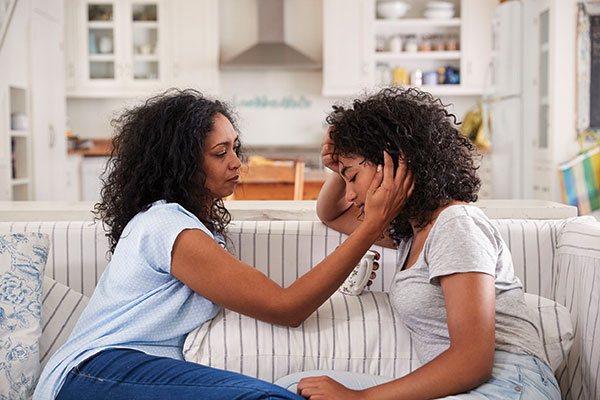Talking with Your Teen about Cancer
by Fred Wilkinson, LICSW
Whether the adolescent in your life is the one coping with cancer or the child, grandchild, or sibling of someone diagnosed with cancer, understanding their developmental needs may make this journey at least a little bit easier on both them and you.
As teens move through the different stages of adolescence, they begin to think for themselves, think critically about their world, assert their independence, and shift their time and attention away from the family unit and toward their peers. This process also brings about increased self-doubt, risk-taking behaviors, and experimentation with identity. Now, throw a diagnosis of cancer into this already turbulent mix, and you can just imagine the challenge parents of teens touched by cancer are up against.
Let your teen know that you will always be honest with them. And then follow through on it.
Communication is key.
Here are some tips to help you talk to your teen about cancer.
Provide routine opportunities for conversation. You may not always get them talking, but by being consistent and sincere, you may catch your teen in the exact right moment for them to open up. Just be aware that being consistent doesn’t mean hovering. Also, ask about them. Not everything has to be about cancer.
Find out what is important to them. How much medical information do they want? How involved in treatment discussions do they want to be? Do they have a big event coming up that they don’t want to miss?
Schedule regular family meetings. We know that plans can change rapidly with treatment, but a weekly meeting to check in, talk about the plan, and give treatment updates can be helpful. A shared family calendar can also help keep everyone on the same page with doctor’s appointments, school and work schedules, and extracurricular activities.
Let your teen know that you will always be honest with them. And then follow through on it. When there is uncertainty, acknowledge it. If you have news, good or bad, answer all their questions as best as you can.
The 3 Stages of Adolescence
- Early adolescents (age 11 to 13): Home life and parents are still central to their lives and their sense of safety. They still think like children, but their emotions may become more intense due to hormonal changes. Teens start to become preoccupied with how they and others look, and wanting to fit in with peers becomes increasingly important.
- Middle adolescents (age 14 to 16): In this phase, teens begin to think of themselves as growing up. They start to experience self-examination and have an increased capacity to have rational discussions and to consider facts in making decisions. They may be more sensitive to criticism due to self-doubt. They are also more likely to be influenced by their peers and to experiment with risky behaviors.
- Late adolescents (17-19): Although lacking life experience, older teens are starting to think more like adults. They are more likely to want to help make decisions that affect their lives, rather than just wanting to know how things are going to affect them. Their need for self-control and independence increases.
Give them choices. Some teens will want to be really involved in the cancer care process, while others will only want to know the “big things.” Let them choose how much information they can handle. You can also give them choices when it comes to day-to-day decisions. For example, if your teen wants to stay at a friend’s house instead of with a relative while you’re in the hospital, hear them out before you make a decision. Giving your teen choices doesn’t mean you let them have whatever they want whenever they want; it just means that you allow room for negotiation when possible.
Let their school counselor know what is going on. The school counselor can watch their grades or monitor changes in behavior that may let you know how they are handling the situation. The school counselor may also be someone outside of the family that your teen can talk to.
Maintain (as much as possible) the same expectations you’ve always had with them. Screen time limits, homework rules, curfews, insisting on knowing the friends they’ll be hanging out with and their plans for the night. These household rules help keep a sense of normalcy during this uncertain time.
Cancer affects everyone in the family.
While only one person may be undergoing treatment, everyone in the family is being affected by the cancer diagnosis, the changes in routine, and the uncertainty. Parents often feel helpless and begin seeking information as a way to gain a sense of control. Teens often feel left out, but seldom speak up because they don’t want to add stress to the family. They may feel less important due to their parents being occupied with treatment demands, or they may feel separated from the family if they are staying with a friend or with relatives during a parent’s cancer treatment. They may also feel angry about the way their life has changed because of cancer, or guilty for feeling angry or upset over seemingly selfish things. If the child is the one with cancer, they may seek ways to control their situation, like refusing to eat or take medications or by withdrawing from others.
Teens often feel left out, but seldom speak up because they don’t want to add stress to the family.
Each family member will respond to the diagnosis in their own way. Try to be understanding and nonjudgmental when dealing with your teen’s emotional reactions.
As with many things involving their children, parents facing cancer in the family often feel like they have to do everything “right.” The truth is, you are doing the very best you can in a difficult situation. It is important to trust your instincts. You are the expert on your kids. Remember, kids are resilient, and they typically adjust more easily to adversity than adults do.

Fred Wilkinson has been a pediatric oncology social worker at Seattle Children’s Hospital in Seattle, WA, since 2001.
If you have questions or concerns about how your child is handling a diagnosis of cancer in the family, please talk with your social worker, child life specialist, psychologist, religious leader, or healthcare provider. It is OK and normal to seek professional help for your children when coping with a serious illness like cancer.
This article was published in Coping® with Cancer magazine, July/August 2020.


